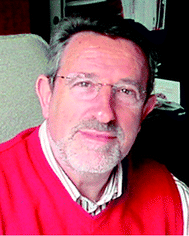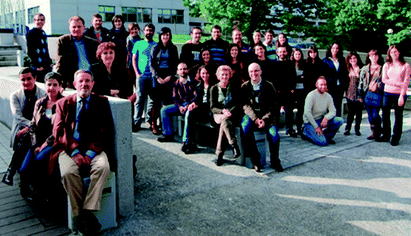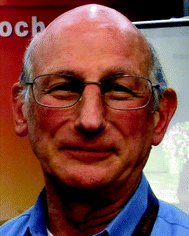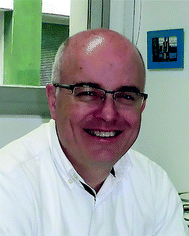Community Leaders: Alfredo Sanz-Medel
Ramon M.
Barnes
a and
Jose M.
Costa-Fernandez
b
aUniversity of Massachusetts, Amherst, USA. E-mail: barnes@chemistry.umass.edu
bDepartment of Physical and Analytical Chemistry, University of Oviedo, Avda. Julian Claveria, 8, 33006 Oviedo, Spain. E-mail: jcostafe@uniovi.es
We are also extremely pleased to report that this singular edition received numerous submissions from well-recognized researchers very active in the field of analytical spectrometry; revealing the international recognition of Alfredo and the appreciation from the spectroscopy community. We know that these contributions will help make the issue truly memorable. Contributions included in this special issue cover many different topics closely related to the activity of Alfredo in spectroscopy research. Some of the contributions focus on new instrumental advances on atomic spectrometric techniques for elemental analysis of different environmentally relevant samples. Quantitative speciation analysis and new instrumental developments for proteomics based on atomic spectrometry tools constitute other topics exemplified in this themed collection. Moreover, the emerging interest in the field of novel atomic tools for nanotechnology is also shown here. In this context, new developments of LA-ICPMS are studied for cell imaging using nanoparticles as labels. The use of sp-ICPMS for nanoparticle sizing is also illustrated. Finally, it should be noted that this set of articles also includes fundamental aspects of atomic spectrometry (e.g., study of mechanistic aspects of photochemical vapor generation). At this point, we would like to thank all the authors for their contributions to this special tribute to the career of Alfredo, and we hope that you enjoy reading them.
Born in Soria and raised in Zaragoza, Spain, Alfredo received his bachelor’s degree with honours in chemistry from Zaragoza University. Here he took his first steps on what has been a life of continuous search for scientific knowledge, obtaining his Ph.D. in chemistry in 1973. Subsequently, he was appointed by the Imperial College of Science and Technology in London, UK, as a postdoctoral researcher, under Prof. T. S. West’s supervision, working on atomic fluorescence. This was an important milestone in his career, because he switched into an innovative research focused on instrumental development. Actually, the experience acquired during his postdoctoral stay greatly influenced his future research. In 1975, he moved to the Complutense University in Madrid, Spain, and later, in 1978, to the University of Oviedo, Spain, where he gained a promotion to full Professor of Analytical Chemistry in 1982, a position that he kept until 2017 when he officially retired. During this period at Oviedo University, Alfredo led, guided, and contributed to an extraordinary array of people, projects, events, and developments, promoting advances in analytical science, particularly in atomic spectrometry. After more than 50 years of teaching and research, the University of Oviedo has acknowledged his extensive scientific background with his nomination as Emeritus Professor.
Alfredo was always proud of the vitality of his research group in Oviedo. Over a 50 year career, the activity of the group has been evolving in very different research subjects representing focal points of continuous innovation (Fig. 2). Achieving this goal was possible thanks to his philosophy of promoting an interdisciplinary approach to scientific research by favoring and enriching multidisciplinary collaborations.
A large part of the studies carried out by Alfredo focus on the progress of elemental speciation analysis. In fact, he was part of the group of pioneers tackling the problem of metal speciation, at the beginning inherently linked to inorganic analysis. His most cited contributions in the topic involve the use of hybrid techniques for ultratrace and trace metal analysis and their speciation to solve many different biological and environmental problems. In this subject, special attention was paid to isotopic ratio measurements for quantitative speciation.
Over a decade ago a change was introduced to the face and scope of the field within the research group – as a logical extension to speciation, work was carried out into the characterization of biomolecules associated with metals and (semi)metals. Consequently, the group started implementing novel analytical strategies (with atomic spectroscopy as the core technology) in combination with organic mass spectrometry for proteomic and metabolomics studies. In this regard, species-unspecific quantification by inorganic analysis was introduced to overcome the lack of standards, or because the standards were not certified for purity or even well characterized, severely compromising the accuracy of the speciation data.
Another point of innovation in Alfredo’s group research was related to the emerging interest in the field of bioanalytical nanotechnology. Alfredo was a pioneer in the use of atomic spectrometry tools to help control the quality of the results of syntheses of inorganic semiconductor nanoparticles, “quantum dots” (QDs), and their use as highly valuable elemental labels for biosensing applications. More recently, this research line focused on developments in environmental analysis, nanotoxicology, drug delivery, metabolic and protein/nanoparticle interactions.
It is also remarkable that, although Alfredo’s research subjects have changed throughout the years, he has also kept some of them along his entire career. Development of innovative analytical instrumentation has been one of his favourite subjects. Particularly interesting is the work with low-pressure plasmas (particularly glow discharges, GDs) for the direct analysis of solids and compositional depth profiles of superposed thin layers. All studies carried out on the design and optimization of a pulsed GD-MS(TOF) to develop “tunable spectrochemical sources” for speciation in a single MS analyser led to a collaboration with Horiba Jobin Yvon (France), that recently resulted in a commercially available Plasma Profiling TOFMS for ultra-fast, sensitive and high-resolution depth profiling.
On top of the important contributions progressing analytical atomic spectrometry, we should not forget that Alfredo has enlarged other research fields in analytical science (i.e., development of photoluminescence-based fiber-optic biosensors, and more recently the study of inorganic nanoparticles as highly valuable photoluminescent labels for sensing and imaging applications). Many important contributions with high impact have been produced in parallel topics that he cared very warmly for throughout his career.
Additionally, because of his clear vision on the role of the researcher, he has always worked closely with industry. It is worth mentioning the relationship that has existed between Alfredo and many private instrumentation companies and research institutions (e.g., hospitals) building research projects focused on the development of analytical science aimed to solve current problems that science, technology and/or society are posing to today’s analytical chemists.
His profound contributions to analytical science are collected in over 650 publications and many book chapters. Moreover, Alfredo has written, edited, or coedited 3 major books in atomic spectrometry and is coauthor of 7 patents on analytical instrumental developments. Regarding the numerous invited lectures he has given at academic institutions and at national and international conferences, many readers of this Editorial will remember him as an excellent communicator.
We can be assured that the general inspiring aspect of Alfredo’s work and his contributions to analytical chemistry will have their continuity. Alfredo has mentored and trained more than 70 Ph.D. students, the great majority of whom have gone on to relevant industry and academic positions all over the world. In fact, Alfredo’s greatest scientific legacy cannot only be reduced to his impressive achievements but the fact that his multidisciplinary and innovative vision of science is now the driving force of the activity of the different groups led by his former students. As a representative example, we would like to make a special mention to 7 of his former Ph.D. students that, to date, have become Full Professors of analytical chemistry in Spain. The first Ph.D. student of Alfredo was Prof. Carmen Camara Rica. She was, until her recent retirement, leader of the prestigious research group of “Trace metals determination and speciation” at the Complutense University of Madrid. At Oviedo University, Alfredo had an amazing impact on the present scientific activity as demonstrated by his former students now Professors at Oviedo – Prof. Marta Elena Diaz (working on molecular recognition and photoluminescence spectrometry), Prof. Jose Ignacio Garcia-Alonso (outstanding researcher on isotopic dilution analysis using enriched stable isotopes), Prof. Elisa Blanco Gonzalez and Prof. Maria Montes Bayon (with highly recognized activity in the field of mass spectrometry tools and chromatographic techniques for clinical and biomedical analyses), Prof. Rosario Pereiro Garcia (with long-standing scientific activity on glow discharge spectrometry and direct solid analysis) and Prof. Jose M. Costa-Fernandez (whose main activity focuses on the use of bioanalytical nanotechnology tools in combination with elemental and molecular spectrometry). Alfredo has received different honorary awards and his achievements in spectroscopy have been recognized by his peers. A few of the awards that underscore his global contributions to analytical science include:
2002: Research Award in Analytical Chemistry (Spanish Royal Society of Chemistry).
2007: Robert Kellner Lecture (Antwerp, Belgium).
2011: European Winter Conference on Plasma Spectroscopy Award (Zaragoza, Spain).
2011: EuCheMS Lecture Award (Belgrade, Serbia).
2015: Colloquium Spectroscopicum Internationale, CSI 2015 Award (Coimbra, Portugal).
Recently, in 2017, the journal “The Analytical Scientist” included Alfredo among the top 10 spectroscopists owing to his “Diverse and extensive contributions to analytical spectrochemical methods” (nominator’s comment).
Furthermore, he was included in the Editorial and Advisory Boards of different journals, being, since 2002, Editor of Analytical and Bioanalytical Chemistry. Additionally, within the field, he has contributed to some of the most relevant meetings in the world as Chairman of important events including the European Winter Conference on Plasma Spectrochemistry (1993), the 1st Mediterranean Basin Conference on Analytical Chemistry (1995), the Colloquium Spectroscopicum Internationale CSI XXXIII (2001), and the Fourth International Symposium on Metallomics (2013).
We would like to end these comments about Alfredo by pointing out that all the scientific achievements would not be so significant, or even possible, without the continuous help and support of his wonderful family – his marvellous wife, Esther, and his 3 children who adopted Alfredo’s love for science, Vicky (Ph.D. in biochemistry), Alfredo (veterinarian degree), and Adrian (Ph.D. in biology).
On behalf of all his colleagues, students, and friends, we wish Prof. Alfredo Sanz-Medel all the best, and hope that he continues supporting the progress of analytical atomic spectroscopy for many years to come.
Ramon M. Barnes
José M. Costa-Fernandez
| This journal is © The Royal Society of Chemistry 2019 |




